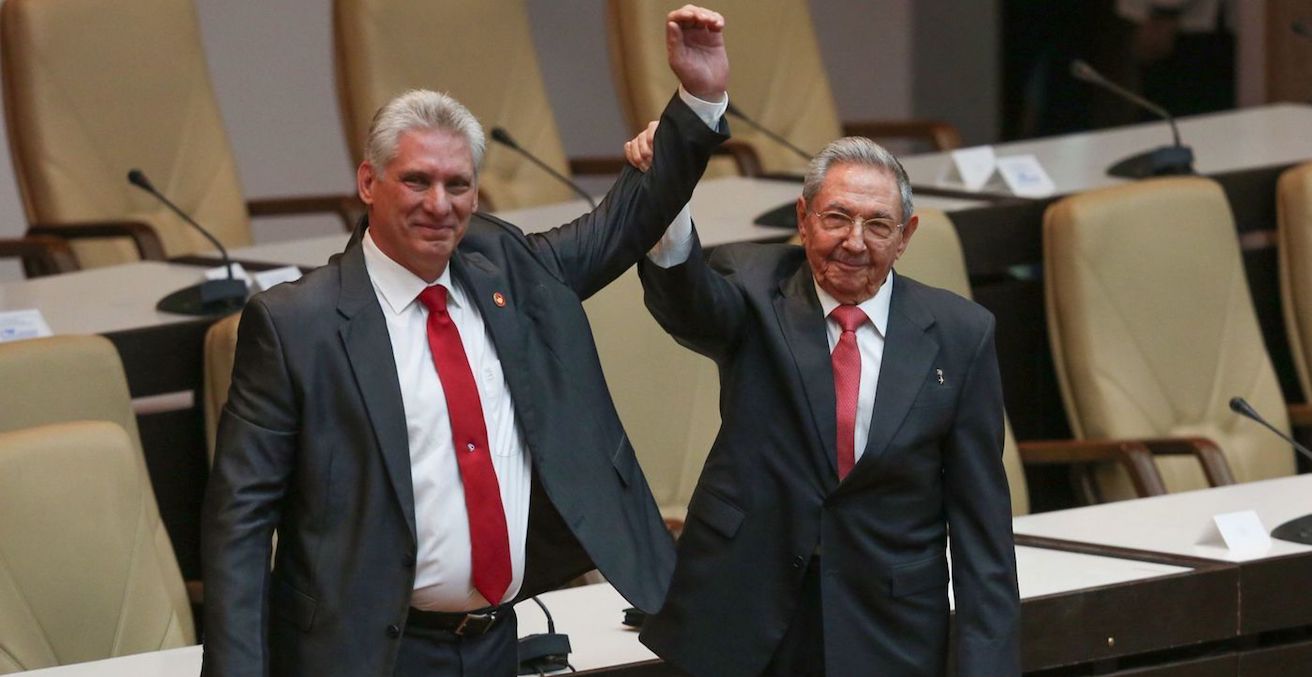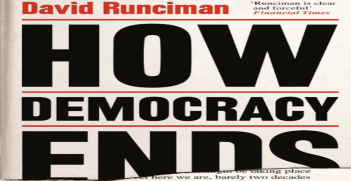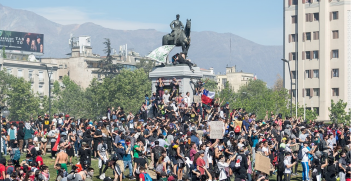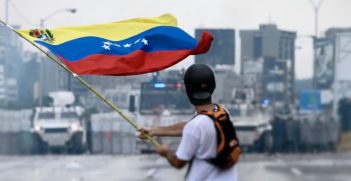For Cuba's Díaz-Canel, the Party Has Just Begun

Cuba has a new head of state in President Miguel Díaz-Canel. However, the residual power of the revolutionary generation means the rejuvenation of the island’s political elite is only getting started.
On 19 April, Raúl Castro stepped down as president of Cuba. It is the first time since 1976 that the island’s head of state has not carried the Castro surname. It is a historic moment for one of the world’s few remaining socialist states, as the founding generation of revolutionaries—led by the Castro brothers for nearly six decades—hands over the reins of the country to a younger generation of Cubans, led by the new president, Miguel Díaz-Canel.
As he slowly withdraws from the political stage, the younger Castro leaves his successor a country in dire economic straits after a decade of half-baked economic reforms. But disappointing or not, the Cuban leader’s tenure has been consequential for the island, where it serves as an uneasy respite between the explosive first act of the elder Castro, and the unwritten chapter of their common successor.
A look back at Raúl’s tenure shows a pragmatic, yet reluctant, reformer whose attempts at changing the socialist system were firmly grounded on his desire to save it. One of Raúl’s main legacies is the overdue acknowledgement that the Cuban socio-economic model was not faring well, and that it was—and remains—in need of reform if it is to thrive at all. This so-called “update” (“actualización”) of Cuba’s socio-economic model, initiated by Raúl in 2011, is a response to the “excessive centralisation” of the existing model, which, in his own words, “conspired against the development of initiative in society and throughout the production chain.”
While not an indictment of central planning as a doctrine, the statement does mark an essential departure from the Marxist orthodoxy of Raúl’s brother and predecessor, Fidel Castro, who consistently labeled Cuba’s economic problems as extraneous to the model. Indeed, the elder Castro went so far as to suggest his brother’s reforms were “concessions to the enemy ideology.” More than a mere change in rhetoric, Raúl’s recognition of the Cuban system’s shortcomings is the conceptual foundation on which he based his reforms, which include trimming the public sector, courting foreign investment and enabling the growth of a diminutive private sector.
Raúl will also be remembered for bringing a small degree of institutionalisation to what had previously been a country largely run on personal charisma and patronage networks. The most salient component of this institutionalisation is the recent process of political succession, which was carried out relatively painlessly, to the chagrin of exiled hardliners who predicted a bitter power struggle. For his last act as head of the Cuban state, Raúl succeeded in engineering an unexciting succession that not only installed a new generation of leaders outside the family, but also allowed him to bow out with considerable influence over the affairs of state.
All of that said, the Castro Era is not over. As First Secretary of the Communist Party of Cuba’s (PCC) Politburo, Raúl holds a firm grasp over the country’s sole political party. A veteran of the country’s “historic generation” of revolutionaries, he also maintains unparalleled influence over the island’s armed forces, which in Cuba wield considerable economic as well as military power.
Other members of the old guard also remain in influential positions. Even within the recently-reconfigured Council of State, old faces including Ramiro Valdés and Guillermo García hold key offices within the state apparatus from where they will carefully watch Cuba’s ongoing process of political rejuvenation.
Where, then, does this leave Cuba’s new head of state, President Díaz-Canel? In truth, it is hard to say, mostly because we know so little about the silver-haired son of the revolution. Most observers only know the few details presented in his official biography, which has been curated to reflect a low-key operator who rose through the bureaucratic ranks. Ostensibly, Díaz-Canel received Raúl’s blessing through administrative competency and loyalty to the party-state, but even these basic assumptions are hard to verify.
Anecdotal accounts of the current president resist neat categorisation. Stories from his time as party secretary of Villa Clara depict a socially tolerant man of the people who was willing to embrace the LGBT community. There is also evidence to the contrary, such as an (allegedly) leaked video in which the Cuban president lashes out against a free-wheeling media, among other groups, for their “subversive” content.
While some still harbour hope that Díaz-Canel is a radical reformer looking for an opening, the notion seems illusory: there is little to suggest that Díaz-Canel is planning to up-end the entire system. During his first speech as president, Díaz-Canel reassured his comrades that the new leadership “will be faithful to the legacy of Fidel Castro, the historical leader of the Revolution,” as well as “Raúl Castro, current leader of the revolutionary process,” before affirming that Raúl would be the one to “head those transcendental decisions of the present and future.”
Given the lingering power of conservative groups, claiming anything but continuity would be politically unwise for the newly-inaugurated leader. Even now, Díaz-Canel and the new members of the Cuban leadership will have to negotiate their plans with Cuba’s two other dominant institutions, the Party and the military, and the traditionalists that stack them.
Following the reshuffle of the Cuban cabinet (known as the Council of Ministers) this summer, Díaz-Canel and Co. will be faced with a packed national agenda. Securing adequate energy sources, attracting foreign investment and unifying the distortionary dual currency system are all priority issues for the new leadership. The Mariel Special Economic Development Zone, Cuba’s economic laboratory, will remain a key project for the leadership, as it aims to save the socialist system from itself.
Born just shy of the revolution, Cuba’s rising leaders face battles no less formidable than the armed struggle of their elders. A slumped economy, a vigilant old guard and an inimical United States will challenge the island’s resourcefulness and vision more than any time since the 1990s—when the collapse of the Soviet Union led to a decade of economic suffering. In the face of these challenges, Díaz-Canel has defiantly claimed that “the Cuban Revolution remains in olive drabs to conquer in all battles.”
Ricardo Barrios is the program associate in the Inter-American Dialogue’s Latin America and the World Program, where he focuses on Chinese engagement with Latin America. He comments regularly on Chinese and Cuban affairs. He tweets @elbarrioschino.
This article is published under a Creative Commons Licence and may be republished with attribution.





